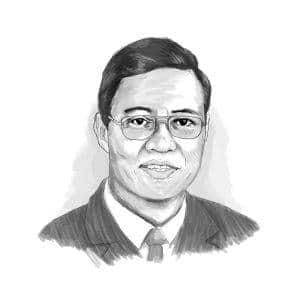WORD ALIVE

It's been related that while Father (later Bishop) Fulton Sheen was giving a public lecture, explaining Jonah and his mission, a heckler from the audience harrased him to the point of being disrespectful. The young fellow expressed cynical doubt whether God could make Jonah live three days in the belly of the whale.
An exhausted Sheen finally said: "Forget it, I'll ask Jonah when I get to Heaven."
"What if he isn't there?" heckled the doubter. "Then you ask him yourself," replied Sheen.
* * *
In the second Sunday after Easter, we encounter a similar doubter—like the above heckler--in the person of Thomas, one of Jesus' apostles.
"Unless I see the scars of the nails in his hands and put my fingrer on those scars and my hand in his side, I will not believe" (Jn 20,24).
* * *
Thomas got his wish after the ensuing week when the Risen Lord appeared. Mildly censuring him, Jesus called him by name and said, "Put your finger here, and look at my hands. Touch and feel my side. Cease to doubt, but believe!" (Jn 20,27).
Confronted with the real person, there was no more need for Thomas to touch, to feel Christ's side. Instead, he fell on his knees and cried: "You are my Lord and my God."
* * *
Jesus acknowledged that Thomas had moved from doubt to faith. "You became a believer because you have seen.
But Jesus refers to his friends who were not present, saying: "Blessed are they who have not seen, and yet they have believed" (Jn 20,29).
* * *
Christian faith has to bear fruit in actual works of love. Paul says that "the only thing that counts is faith active in love" (Galatians 5,6); St. James teaches, "Faith without works is dead."
* * *
There’s a story about an old monk who prayed many years for a vision from God to strengthen his faith, but it never came. He had almost given up hope when, one day, a vision of Christ’s face appeared in his cell. The old monk was overjoyed.
But then, right in the middle of the vision, the monastery bell rang. The ringing of the bell meant it was time to feed the poor who gathered daily at the monastery gate.
* * *
How could he leave now? What should he do—stay with his heavenly Visitor, or go to his duty of distributing help to the needy. If he failed to show up with food, the unfortunate people would leave quietly, thinking the monastery had nothing to give them that day.
After some agonizing moments, the monk made his decision. With heavy heart, he turned his back on the vision and went off to feed the poor.
* * *
When the old monk returned to his room and opened the door, he could hardly believe his eyes. The room was filled with heavenly brightness.
As the monk dropped to his knees in thanksgiving, the vision said to him, “My son, had you not gone off to feed the poor, I would not have stayed.”
* * *
The moral of the story is that true Christian faith should not remain only in prayers and devotions but in reaching out to people in need.
Thomas, who professed his faith in the Risen Christ, exemplified this faith-in-action. After the encounter with the Risen Lord, he journeyed to far away India, courageously proclaming the teachings of Christ and eventually giving his life as a martyr of faith.
* * *
Let’s ask ourselves: Are we “faith-full” as far as Sunday massgoing and devotions are concerned? Or, is our faith alive in good works, too?
* * *
Joy. Pope Francis had always exuded joy as shown, thus, “They think that being Christian means being in perpetual mourning.”
The jovial Pope added: “An ambassador for the faith must never look like someone who’s just come back from a funeral.”
* * *
Political Advice. When Pope Francis came to the Philippines last 2015, he showed that he cared for the political leaders when he said, “As many voices in your nation have pointed out, it is now, more than ever, necessary that political leaders be outstanding for honesty, integrity and commitment to the common good.”
* * *
Pope Francis added: “I hope that this prophetic summons will challenge everyone, at all levels of society, to reject every form of corruption which diverts resources from the poor, and to make concerted efforts to ensure the inclusion of every man and woman—and children—in the life of the community.”
* * *
In a nutshell, “our political leaders should always work for the common good.” “Bayan Muna Hindi Bulsa,” a poster was put it.